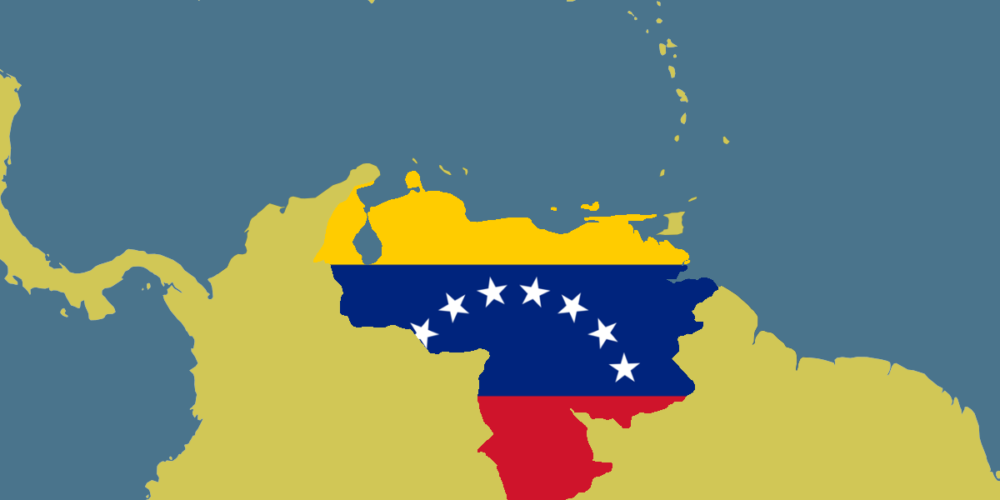This is an edited version of a document supplied by the Venezuela-Ireland Network
In our media the economic and political difficulties in Venezuela are usually presented as recent developments. In most reports, all blame is laid on the alleged failure of the Bolivarian Revolution. Absent from the narrative are any accounts of US interference leading up to the present situation. What never emerges is the fact that such threats began from the first day of the revolution.
The following is a short history of US actions in Venezuela, showing that the war began in the very early days of President Chávez’s strategy for the Bolivarian Revolution
2001
At the end of 2001 the US government despatches a senior State Department official and regional enforcer to Caracas, where he bluntly threatens dire reprisals—destabilisation—if Venezuela fails to line up with America’s campaign to reimpose its global hegemony.
2002: Coup d’état
Two leading coup plotters, General Efraín Vásquez Velasco and General Ramírez Poveda, were trained at the US Army’s School of the Americas.
2002: The day after the coup
After the failure of the coup, the Agency for International Development (a US government body), together with the National Endowment for Democracy (a “soft power” organisation supported by the CIA), open an “Office of Transition Initiatives” in Caracas. Their plan is to invest more than $100 million in efforts to undermine the Chávez government and reinforce the opposition over the following eight years.
December 2002 to February 2003: The oil lock-out
The United States backs the bosses’ lock-out in the Venezuelan oil industry.
2004: Recall referendum
The United States channels funds through the National Endowment for Democracy and other front groups. It bankrolls a “recall referendum,” which is decisively defeated.
2004–2008
Colombia “grants” the United States the use of seven military bases.
2005–2006
The Agency for International Development’s main intermediary, Development Alternatives Inc., is obliged to close its office in Caracas. The US government apparently seeks new funding channels, one of which is a group called the “Pan-American Development Foundation,” which finances opposition journalism, among other things.
2006
The first US sanctions on Venezuelan individuals are imposed.
2007
The proposed constitutional amendment for “21st-century socialism” is defeated. The United States supports opposition groups.
2010
In November 2010, according to e-mail messages obtained by Venezuelan security services, Juan Guaidó, Yon Goicoechea and several other student activists attend a secret five-day training session at a hotel in Mexico.
FRIDE, a Spanish right-wing think tank, publishes a report prepared with funds from the “World Movement for Democracy” (a project of the National Endowment for Democracy) that discloses that international agencies are subsidising the Venezuelan opposition with an annual $40–50 million. Funds donated by American and European agencies and foundations are given to the right-wing parties Primero Justicia (First Justice), Un Nuevo Tiempo (A New Time) and COPEI (the right-wing Social Christian Party), as well as to a dozen or so NGOs, students’ groups, and media.
The report mentions many groups that have been contributing since at least 2002, including the Carter Center, the International Republican Institute, the National Democratic Institute, the Open Society Institute, the Pan-American Development Foundation, the Agency for International Development, and the National Endowment for Democracy, as well as multilateral institutions, including the Organization of American States and the European Union.
2012
In the Obama government’s foreign operations budgets, between $5 and 6 million has been included to finance opposition groups in Venezuela since 2012.
2013
US Embassy officials are expelled for their participation in destabilisation activity with members of the far-right opposition.
In November 2013 a document entitled Plan Estratégico Venezolano (Venezuelan Strategic Plan) surfaces after cases taken by the lawyer Eva Golinger. It includes a plan by representatives of the United States, Colombia and Venezuelan oligarchs to undermine the Venezuelan economy as part of a plot to remove President Maduro.
2013–2014
The Agency for International Development and the National Endowment for Democracy filter more than $14 million to opposition groups in Venezuela, including their political campaigns in 2013 and for the current anti-government protests.
2014
In May the Venezuelan government releases documents describing an assassination plot against President Maduro.
More sanctions are imposed when the US House of Representatives passes the “Venezuelan Human Rights and Democracy Protection Act.”
In December the US Congress passes the “Venezuela Defense of Human Rights and Civil Society Act,” which directs the president to impose further sanctions.
2015
Obama signs a presidential order declaring Venezuela an “unusual and extraordinary threat” to US national security interests.
2017
In August an executive order specifically bars revenue from Venezuela’s state oil company being paid from the United States, prohibits the Venezuelan government to sell bonds, and even bars it from receiving loans. These sanctions are designed to prevent Venezuela’s own money from entering Venezuela.
2017–2018
According to the Venezuelan government, the United States is also involved in a plot to capture President Maduro at the presidential palace, and another plot to murder him at a military parade in July 2017. A year later exiled right-wing leaders try and fail to kill him with drone bombs during a military parade in Caracas.
2019
On 30 April another attempted coup by Juan Guaidó calls for a military uprising. The US national security adviser, John Bolton, calls on the Venezuelan army to support the coup.
The convicted criminal Leopoldo López, who had earlier been broken free from house arrest by opposition supporters, is forced to hide in the Spanish embassy.
The president of the EU Parliament, Antonio Tajani, states: “Today marks a historic day for the return of democracy and freedom to Venezuela, which the European Parliament has always supported. The freeing of Leopoldo López by soldiers obeying the constitution is great news.”
At the time of writing, a new action against the Venezuelan people is under way but appears to have been defeated.






